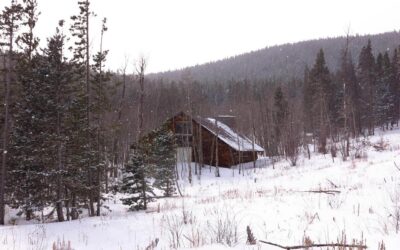Researchers debriefed global participants on microplastics in the environment, a new online snow tracker tool for water resource management, and the role of dogs in body recovery.
Link to Event Video Presentation Available at – https://www.dri.edu/conversations-with-dri-innovators/.
Las Vegas, Nev. (Friday, Nov. 13, 2020) – Nevada-based scientists from the Desert Research Institute (DRI) shared their most recent findings and potential solutions to environmental and climate change questions with a global audience this week during the first “Conversations with DRI Innovators” virtual event.
Tuesday’s 60-minute presentation featured research on microplastics in Lake Tahoe and the Las Vegas wash using a state-of-the-art instrument, a look at how dogs can help recover drowned victims in the deep waters of Lake Tahoe, and also as criminal trial evidence, the development of a real-time snow tracker online tool, and the chemistry of snowfall in the Sierras for water resource management and public safety.
“These findings have far-reaching impact beyond Nevada and our country as the work of DRI researchers can be found around the world,” said Tina Quigley, DRI Foundation Chair. “While this research was centered throughout Nevada, DRI scientists are working on finding real-life solutions to these real-world questions that will benefit all of us, our families, our earth.”
The DRI Foundation’s Innovation Research Program (IRP) awarded seed grants to kick-start the highlighted research and talented scientists. This early support has been leveraged into other awards such as from the National Science Foundation and National Weather Service to continue expanding their developing research.
“This is donor-driven research funding at its best, and I am proud to be part of the group cheering on some of the greatest minds of the scientific community from right here in Nevada,” added Quigley.
A video recording of the fast-paced, hour-long presentation from IRP grant recipients and DRI faculty along with additional information may be found online at – https://www.dri.edu/conversations-with-dri-innovators/.
The four speakers and the topics covered, in order of presentation along with approximate start times for each, are as follows:
- :04 – DRI, IRP overview, and speaker introductions. – Tina Quigley, Moderator, Former CEO of the Regional Transportation Commission of Southern Nevada
Each presentation runs approximately 10 minutes.
- 7:33 – Types of microplastics found at Lake Tahoe and Las Vegas Wash and how an easy to install mesh currently being tested on clothes dryer vents may be part of the solution. – Dr. Monica Arienzo, Assistant Research Professor, DRI Division of Hydrologic Sciences and National Science Foundation Grant Recipient.
- 22:11 – A new online tool just developed will help track snow droughts in a warmer climate in order to help understand the need for changing water resource management strategies. – Dr. Daniel McEvoy, Assistant Research Professor of Climatology, DRI Division of Atmospheric Sciences, Researcher with the Western Regional Climate Center and National Weather Service Grant Recipient.
- 34:23 – Using the chemistry of atmospheric river snowfall to improve water resource management in the Western U.S. – Dr. Nathan Chellman, Postdoctoral Fellow, DRI Division of Hydrologic Sciences.
- 46:59 – Advancing the science of canine odor detection – from criminal trials to accidental drownings and how dogs and plants may help detect cadavers. – Dr. Mary E. Cablk, Associate Research Professor of Biology, DRI Division of Earth and Ecosystem Sciences, University of Nevada, Reno Adjunct Professor in Forensic Anthropology
and Auxiliary Deputy with several county Sheriff Offices in the State of Nevada.
###
About the DRI Foundation Innovation Research Program (IRP): The DRI Foundation’s IRP provides the start-up funding DRI scientists need to test new ideas and produce initial data, which will help them build the scientific case for future research projects. The 2020 Innovation Research Project winners were selected through a competitive selection process. The selected projects demonstrate creative, innovative research or technological development that advances DRI’s mission. For more information on this and other upcoming events please visit: https://www.dri.edu/support-dri/dri-foundation/
About the Desert Research Institute (DRI): The DRI is a recognized world leader in basic and applied interdisciplinary research. Committed to scientific excellence and integrity, DRI faculty, students, and staff have developed scientific knowledge and innovative technologies in research projects around the globe. Since 1959, DRI’s research has advanced scientific knowledge, supported Nevada’s diversifying economy, provided science-based educational opportunities, and informed policy makers, business leaders, and community members. With campuses in Reno and Las Vegas, DRI serves as the non-profit research arm of the Nevada System of Higher Education. For more information, please visit www.dri.edu.
Media Contact
Justin Broglio
Communications Manager, Desert Research Institute
775-762-8320
Justin.Broglio@dri.edu


